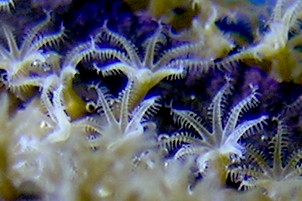"...they took it for the howling of the storm." I feel like this is a comment Simon Cowell would say on American Idol to a contestant that was convinced they were talented. I can just picture someone singing their heart out and Simon responding
"I couldn't quite understand the song...so I mistook it for the howling of a storm," and waving goodbye as he chews on a pen in the most condescending fashion humanely possible.
Now we are into the part in which Anderson is describing Ursula's wretched home and the ugly evils that are within. The word "polypi" is used to describe the creatures that surround her house. I looked up what this word meant and it brought much confusion. Google says that this is a "polypus":
If Google was correct, which it usually is, then what exactly are these things that Disney depicted in the movie?
It is interesting to me that Disney excluded the pain that came with using human legs for the Little Mermaid. However, I do understand that it definitely gives the story a more tragic and dark tone.
Additionally, I think the Disney version was more successful among audiences because the line between good and evil was more clearly defined. In this version, there isn't a true villain or hero that consumers can choose to side with. Although the Sea Witch is clearly malevolent to some degree, she never really does anything to the Little Mermaid that wasn't described and cautioned beforehand. The Prince, while he is illustrated as handsome and arguably pleasant, is the main cause of the Little Mermaid's death, but is he really a "villain" for just falling in love with another girl? In the Disney adaptation, Ursula is shown to be deceitful and evil, while the Prince is attributed with kindness and humility. Because of this, the audience can fully justify to themselves why they are rooting for the success of the Little Mermaid and for Ursula to be conquered.
Anderson's version of this tale left me feeling torn, much of this happened because of the selfish nature of the Little Mermaid's actions. She gives up her life and puts her family at risk to pursue a love built upon physical attraction alone. Oh well. That is what the Bachelor is founded off of right?



No comments:
Post a Comment